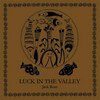Jack Rose, "Luck in the Valley"
 The death of Jack Rose in December brought a premature end to a career that was just getting started. His last album covers nearly every aspect of his repertoire, from ragtime to country-blues to his signature long-form guitar ragas. While it should not be taken as a last testament, Luck in the Valley contains the stylistic and expressive breadth that defined Rose's life as an artist.
The death of Jack Rose in December brought a premature end to a career that was just getting started. His last album covers nearly every aspect of his repertoire, from ragtime to country-blues to his signature long-form guitar ragas. While it should not be taken as a last testament, Luck in the Valley contains the stylistic and expressive breadth that defined Rose's life as an artist.
Even in a genre filled with iconoclasts and loners, Rose stood out as an individual. Received wisdom would have solo guitar music be a ponderous, mostly technical exercise for hermetic aesthetes. Rose studiously avoided that cliché. In fact, he toyed with those expectations throughout his career. The title of his 2008 live album, I Do Play Rock and Roll, is an inversion of Fred McDowell’s rallying cry for blues fundamentalism. Rose never fit in completely with the traditionalists or the avant-garde. He often switched between the two modes, often more than once within the course of a single song, as in the title track off Luck in the Valley. It starts off slowly in a minor key, the perfect intro for somber ragas that defined Rose’s earlier albums. Instead, he transforms the piece into a jubilant, quick-footed blues piece. The switch feels unforced, like a card trick played among friends.
For all his technical ability, Rose’s playing often had a raucous, unkempt manner. This reflects the music’s origins in the barns, brothels, and gambling dens of the early 20th century. Though Rose played mostly in concert halls and art galleries, his music still kept roots in folk dance and early popular music. Three out the ten songs in Luck in the Valley are covers, and they are among the album’s highlights. The closing track, “West Coast Blues” by Blind Blake, demonstrates Rose’s knack for breathing life into older material. The rapid fire riffing between guitar and banjo resembles a bar-room hustle more than a pious reconstruction. Rose’s talent for old time music isn’t confined to covers, his original material can be just as direct. “Lick Mountain Ramble,” a rollicking bluegrass piece, possesses an exhilarating joyousness that stands apart from any art-music pretention.
Luck in the Valley is a solo album in loosest sense of the term. Rose is joined by a multitude of other musicians, including Glenn Jones as well as the Black Twig Pickers, a bluegrass band from rural Virginia, who collaborated extensively with Rose on his last albums. These players are more than just sidemen. The accompaniment plays as much of a role in Rose’s compositions as the guitar does, as with the sweet rush of fiddle on “Lick Mountain Ramble” or the hollow twang of the banjo in “Moon in the Gutter.”
Excellent as the collaborative tracks are, there is still ample space on Luck in the Valley for Rose to display his talent for solo arrangements. The opening track, “Blues for Percy Danforth,” comes closest to a true raga out of any of Rose’s compositions. He lays down fluid, buzzing lines on the lap steel guitar to the accompaniment of jaw-harp, bleating harmonica, and subtle tambora droning. The tempo gradually swells, brassy tones undulating like the sun reflected in some derelict harbor. More than any formal connection with raga, “Blues for Percy Danforth” retains the forceful serenity of North Indian music. “Tree in the Valley” possesses a stark beauty as well, but with the passionate vigor more naturalistic than it is holy. Over the course of six minutes, Rose plays dizzying flamenco-like guitar riffs that twist and turn like the gnarled branches of some weather-beaten oak.
Rose was no prodigy. He took up finger-style guitar in his late 20s and practiced for years before bringing his music to the public. The resulting completeness of style along with Rose’s traditional repertoire often hid the restless innovation in his music. His rejection of twelve string guitar, the instrument that he built his reputation on, is just one instance of the artistic chances he took. It is vain to speculate on what Rose could have accomplished had he lived longer, but if Luck in the Valley is any indication, he kept his talent and vision to the very end.
samples:



